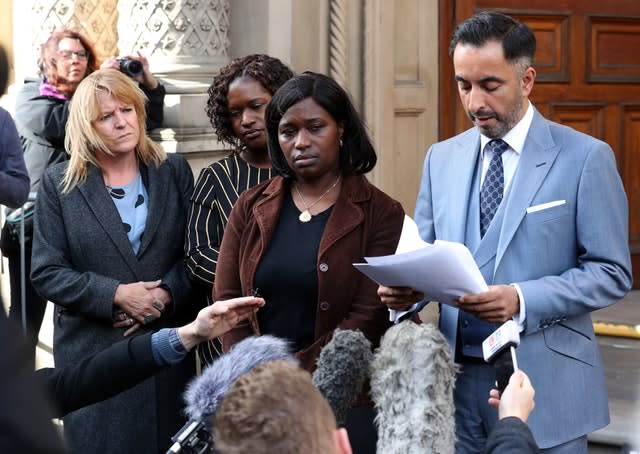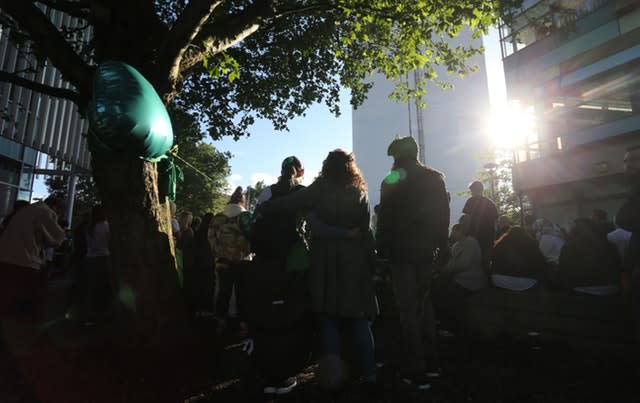Bereaved families fear Grenfell Tower report will be ‘buried in Brexit’
Families of those killed in the Grenfell Tower blaze fear a report into what happened will be “buried in Brexit” after it was revealed that it will be published a day before Britain is due to leave the European Union.
Prime Minister Boris Johnson, in a letter to inquiry chairman Sir Martin Moore-Bick, set a deadline of October 30 for making public the initial findings on the west London fire.
The stage one report from the ongoing inquiry, examining the deaths of the 72 people victims, is expected to shed light on how the fire started, the reason it spread as it did, and the reaction from the emergency services, as well as issuing recommendations.
But survivors’ and bereaved families’ group Grenfell United said the publication date was “deeply frustrating” and had caused “upset” in the community.
The group’s chairwoman, Natasha Elcock, has written to Sir Martin, warning that his recommendations will “not receive the attention (they) deserve” if they are released only a day before Brexit.
“To publish the report on October 30 risks burying it in Brexit,” she said in her letter.
“The UK is set to leave the European Union the next day. This is the most significant constitutional moment for our country in living memory.
“Laying the report in Parliament on October 30 will guarantee that the report will not receive the attention it deserves.”
She urged Sir Martin to seek a new date for publication in order to keep bereaved families on board with the probe.
“There has been no consultation with any survivors and bereaved families around the date of publication,” said Ms Elcock.
“This is not the first time we have had to question whether bereaved families and survivors are really at the heart of this inquiry.
“It is not too late to change the date and ensure that the report is published at a time that will give it the chance of being reported across the country, so that organisations and institutions will be held to account and feel pressure to make changes.”
Inquest, a charity campaigning for justice on behalf of the bereaved, also called for the papers to be published “as soon as possible” to avoid being overshadowed by the ongoing Brexit saga.
Executive director Deborah Coles said: “At present, the timing of the report’s publication will be when political and public attention is focused on Brexit.

“This report must be published as soon as possible to enable the necessary parliamentary scrutiny, debate and the need for possible urgent legislation.”
In a letter to Sir Martin on October 3, Mr Johnson said: “I invite you to publish the Phase 1 report without delay.
“I would be grateful if you could publish as soon as you are able to, and no later than 30 October 2019.”
Sir Martin said he would be making a copy of his findings available to the families and survivors at least 36 hours before making it public.
In a statement, an inquiry spokesman said: “The chairman believes that it is very important that those most affected by the fire have the opportunity to read and absorb the key findings in the report before it is made public.
“In particular, he wishes to avoid a situation in which bereaved, survivors and resident core participants learn of any of the contents of the report as a consequence of media coverage arising from premature or unauthorised disclosure.”
The report, which follows the first phase of the inquiry, will focus on what happened on the night of the fire and was expected to be published in spring.

There was an outcry from groups representing survivors and families of the 72 people killed in the June 14 2017 inferno earlier this year after it was revealed publication would be postponed by almost six months.
Ms Elcock branded the initial delay “disgraceful” at the time.
The hold-up was down to the initial investigation being a “far more complex and time-consuming task than the inquiry had originally anticipated”, according to a letter published in May from Caroline Featherstone, solicitor to the inquiry.
Ms Featherstone said the Phase 1 report would explain “how it spread” and what occurred on each floor of the block of flats in the summer of 2017.
“That involves an almost minute-by-minute description of how the fire started, how it spread and what was happening on each floor of the tower,” she said in her letter at the time.
“It also involves a detailed description and analysis of what was happening in the incident control room and on the ground, as well as the response of the emergency services and relevant organisations.”
The second stage will focus on establishing how Grenfell Tower came to be in a condition that allowed a tragedy on such a scale to occur.
Hearings for Phase 2 are expected to start in January.

 Yahoo News
Yahoo News 
